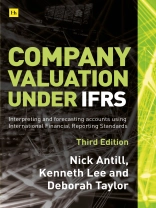Revised and updated.
The influence of International Financial Reporting Standards (IFRS) on accounting across the world is stronger than ever. Most importantly, this stems from the mandatory adoption of IFRSs in many parts of the world, including Europe, Canada, Australia, Brazil and, with some relatively small exceptions, China. Additionally, foreign registrants in the US are also permitted to use IFRS by the SEC. The impact of IFRSs also extends to accounting developments as the IASB and the FASB work closely together to formulate new standards such as those recently issued on leasing and revenue recognition. It is clear that investors, analysts and valuers need to understand financial statements produced under IFRS to feed in to their valuations and broader investment decisions.
Written by practitioners for practitioners, the book addresses valuation from the viewpoint of the analyst, the investor and the corporate acquirer. It starts with valuation theory: what is to be discounted and at what discount rate? It explains the connection between standard methodologies based on free cash flow and on return on capital. And it emphasizes that, whichever method is used, accurate interpretation of accounting information is critical to the production of sensible valuations. The authors argue that forecasts of cash flows imply views on profits and balance sheets, and that non-cash items contain useful information about future cash flows – so profits matter.
The book addresses the implications for analysis, modelling and valuation of key aspects of IFRS, all updated for recent developments, including:
– Pensions
– Stock options
– Derivatives
– Provisions
– Leases
– Revenue recognition
– Foreign currency
The text also sets out the key differences between IFRS and US GAAP treatments of these issues, in addition to their implications for analysis.
A detailed case study is used to provide a step-by-step valuation of an industrial company using both free cash flow and economic profit methodologies. The authors then address a range of common valuation problems, including cyclical or immature companies, as well as the specialist accounting and modelling knowledge required for regulated utilities, resource extraction companies, banks, insurance companies, real estate companies and technology companies. Accounting for mergers and disposals is first explained and then illustrated with a detailed potential acquisition.
Circa l’autore
Kenneth’s career has steadfastly remained centred around nance, research and education. Kenneth is an Associate Professorial Lecturer at the London School of Economics and Political Science, where he lectures on financial analysis and equity valuation, as well as being the programme director for the MSc Accounting and Finance and MSc Accounting, Organisations and Institutions.
Before academia Kenneth was a Managing Director and Head of European Equity Research at Barclays Capital, where he worked for eight years before leaving in August 2017 to take up a number of academic positions. Prior to this he was also a Managing Director and a ranked accounting and valuation analyst at Citi Investment Research in London. During this time Kenneth published extensively on accounting and valuation topics for investors and was ranked in the top three in the Institutional Investor Survey over more than a continuous ten-year period.
In the lead up to his investment banking career, Ken was a professional trainer for many years both in professional practice and financial markets. His love of training was behind his decision to leave his banking career for academia.
Kenneth graduated from Trinity College Dublin/Dublin Institute of Technology with a degree in Management Science. He is a Fellow of the Institute of Chartered Accountants, a member of the Institute of Taxation, a CFA Charterholder and a member of the Securities Institute. He holds a doctorate from Aston University on how sell-side analysts make stock recommendation decisions.
In addition to co-authoring Company Valuation Under IFRS, Ken has also co-authored an accounting book (with Deborah Taylor) entitled Financial Statement Analysis Under IFRS (Financial Edge, 2018).












